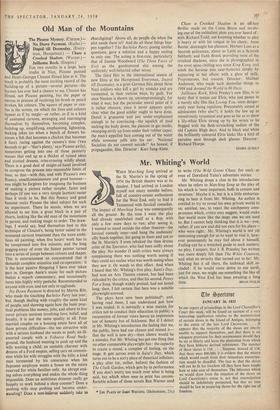Mr. Whiting's World
WHEN Marching Song arrived at the St. Martin's in the spring of 1954 the British theatre was at its deadest. I had arrived in London myself not many months before, full of country-cousin enthusiasm for the West End, only to find it Tennented with farcical comedies. The impact of Marching Song was consequently all the greater. By the time I went the play had already established itself as a flop, with only a few more days to run; after seeing it, I wanted to stand outside the other theatres—the farcical comedy ones—and bang the audiences' silly heads together, for going to them and not to the St. Martin's. I even rebuked the then drama critic of the Spectator, who had been sniffy about the play. No wonder (I said) critics were always complaining there was nothing worth seeing if they could not realise what was worth seeing when they saw it. Or words to that effect. And when I heard that Mr. Whiting's first play, Saint's Day, had won an Arts Theatre contest, but had been ridiculed by the critics; and that his second, Penny For a Song, though widely praised, had not lasted long; then, I felt certain that here was a notable playwright scorned.
The plays have now been published*; and, having read them, I can understand just how I was misled. It is normally a wise maxim for critics not to conduct their education in public; a recantation of former views leaves an impression not of honesty but of fickleness. But if I detect in Mr. Whiting's introduction the feeling that we, the public, have had our chance and missed it— that the well is now dry—then silence would be a mistake. For Mr. Whiting has got one thing that no other comparable playwright has : the capacity to create a mood, a complex of feeling, on the stage. It gets across even in Saint's Day, which turns out to be a sorry piece of theatrical inflation; a play after (or, rather, before) the fashion of The Chalk Garden, which gets by in performance if you don't worry too much over what is being said, but which when seen in print has uncom- fortable echoes of those novels Rex Warner used
• THE PLAYS OF,JOHN WHITING. (Heinemann, 21s.)
to write (The Wild Goose Chase, for one); or even of Dornford Yates's adventure stories.
Mr. Whiting drops a clue in his introduction when he refers to Marching Song as the play of his which is 'most important, both in content and structure.' Maybe it is, but it is a little embarras- sing to hear it from Mr. Whiting. An author is entitled to try to reveal his own private world to us; entitled, too, to reject the catchpenny com- promises which, critics may suggest, would make that world more like the stagy one we are used to. But I cannot help thinking that it is we—you, rather, if you saw and did not care for his plays— who were right : Mr. Whiting's world is not yet interesting enough for us to want to visit it, how- ever passionately he may feel about it himself. Feeling can be a wretched guide in such matters; no play, I suspect, that J. B. Priestley has written was more deeply felt than The White Countess, and what an atrocity that turned out to be! Mr. Whiting has it all there, the technical skill in- cluded: if he would come down to our earth, just for once, we might see something the like of which the West End has been awaiting a long


































 Previous page
Previous page